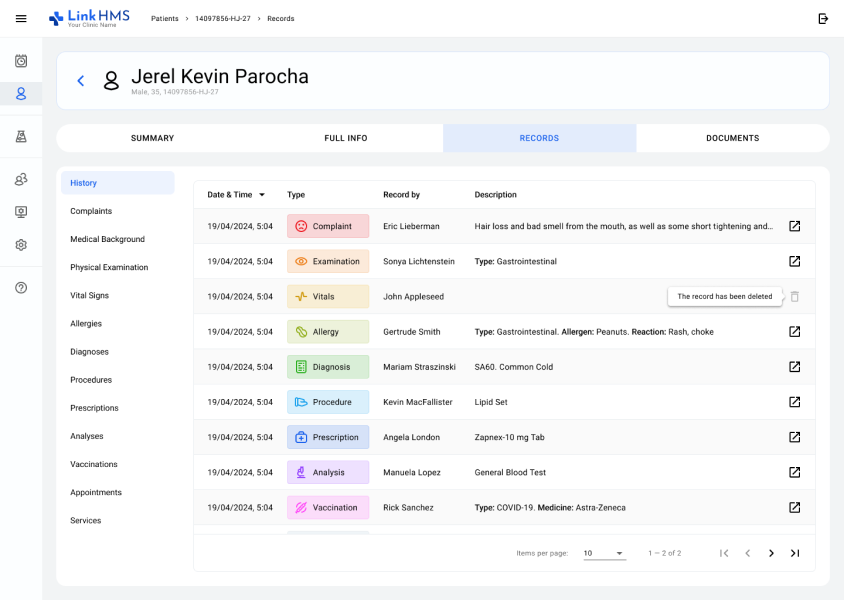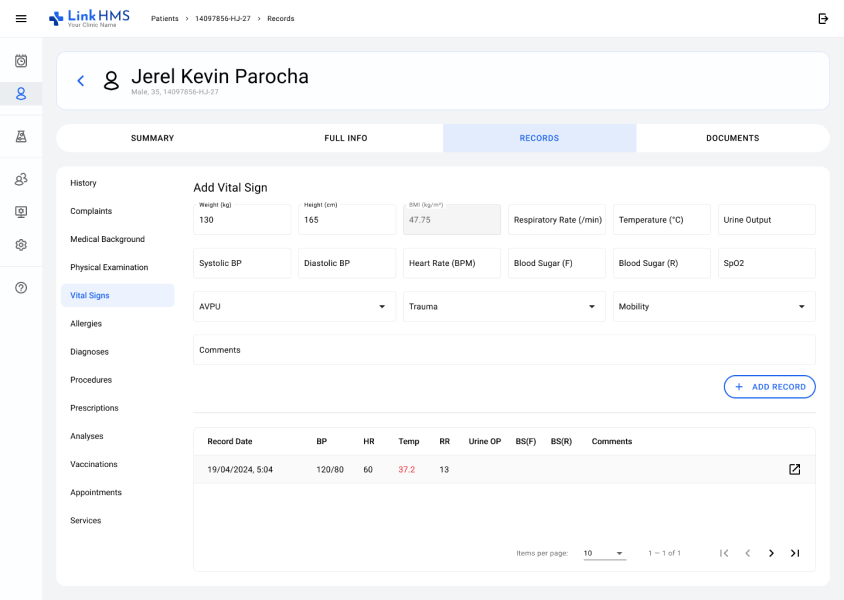
What makes efficient hospital management? How can you distinguish clinic operations with the advanced hospital management software features? Let’s specify the core HMS functionality to streamline workflows and improve patient care within the clinic.
When the market is full of diverse hospital management software, health facilities have the flexibility to find software products that best fit their unique needs, budget, and size. However, there is one decisive thing that continually defines the final choice.
Of course, only efficient hospital management software features lay the solid foundations for smooth operations within the clinic. So, what functionality should be included in the hospital management system?
List of Content
- EMR module
- Scheduling functionality
- Appointment management
- Nursing module
- Hospital administration feature
- Lab management
- HR management
- Conclusion
EMR
Primary purpose: centralized and secure patient records
Used by: doctors, nurses, medical assistants, lab technicians, and administrative staff.
The Electronic Medical Records (EMR) feature provides healthcare providers with up-to-date and accurate patient data. It commonly contains comprehensive data about a patient’s medical history, diagnoses, treatment plans, medications, and test results.
Instant data access makes it easier to manage patient records, track medical histories, and streamline workflows for better care coordination and decision-making. Large public hospitals, private clinics, and other healthcare facilities utilize EMRs to improve patient care, enhance data accuracy, and ensure compliance with healthcare regulations. This module also embraces access controls and security measures to protect data and maintain healthcare confidentiality and privacy.
SCHEDULING MODULE
Primary purpose: optimized appointment and resource management
Used by: receptionists, clinic managers, doctors, and administrative staff.
The scheduling management functionality organizes and manages all appointments, staff schedules, and resource allocation for healthcare facilities. It allows administrators, doctors, and receptionists to efficiently coordinate patient appointments for optimal use of time and resources.
The feature reduces administrative work by handling appointment rescheduling and cancellations and sending automated reminders to patients, minimizing no-shows. This module helps clinics streamline the scheduling process, reduce conflicts, and offer real-time visibility into doctor availability. Additionally, it can manage complex workflows, such as prioritizing urgent cases or handling multi-department appointments.
APPOINTMENT MANAGEMENT
Primary purpose: Streamlined workflows and documentation
Used by: doctors, nurses, physician assistants, and hospital administrators.
The appointment management feature is designed to handle visit appointments and medical practitioners’ daily tasks. It provides a clear, organized view of the doctor’s schedule, displaying upcoming appointments and patient details. Doctors can quickly access patient records, review medical history, and update EMR with diagnoses and prescriptions. Their dashboards often include task management to prioritize tasks, request lab tests, and track the status.
It also supports real-time updates, ensuring that any last-minute changes to the schedule or patient information are immediately reflected. Medical practitioners can communicate with other departments, such as labs or reception, through the HMS system for real-time data and seamless coordination.
Looking for distinguishing hospital management features for your health facility?
Experience seamless clinic management with our all-inclusive HMS system. We have featured a range of cutting-edge modules to elevate your hospital workflows to a new level.
NURSING MODULE
Primary purpose: Improved patient monitoring and updates
Used by: nurses, nurse assistants, nurse managers, and clinical coordinators.
It is another hospital management module that helps nurses handle patient care easily. It allows them to see patient records and update essential details, like vital signs. Nurses can track treatments and share information with doctors. It’s critical that medical practitioners have the most recent data for better decisions.
The module also links to the EMR so that nurses can view a patient’s history and treatments all in one place. Daily tasks become more straightforward, and communication between nurses and doctors improves with good HMS functionality. It helps nurses provide better patient care and run hospital processes more efficiently.
HOSPITAL ADMINISTRATION
Primary purpose: smooth operations and staff management
Used by hospital administrators, clinic managers, department heads, and adminstrative staff.
The hospital administration module embraces all the necessary functionality to manage the facility’s operations. It allows administrators to control staff roles, manage user access, and handle billing tasks. They can add or remove users, assign permissions, and update hospital and department details.
This feature tracks important data like hospital capacity and patient flow, helping keep everything running smoothly. It also connects with other hospital management system modules to give a complete view of hospital activities. This integration ensures that data is consistent across the system. Making administrative tasks easier improves hospital management, enhances efficiency, and gives staff and patients a better experience.
LABORATORY MANAGEMENT
Primary purpose: coordinated lab tests and reporting
Used by lab technicians, laboratory managers, lab assistants, and clinical coordinators.
This separate HMS feature allows lab staff to efficiently handle test requests and results. Laboratory specialists can receive doctor test requests, track progress, and enter results directly into the system. These results are automatically added to the patient’s medical records for doctors to view.
The hospital management system module also allows the hospital staff to check the status of tests, organize schedules, and prioritize urgent cases. It improves communication between doctors and lab scientists, reducing mistakes and delays. It provides faster and more accurate test results and precise coordination between all departments.
HR MANAGEMENT
Primary purpose: coordinated recruitment, training, and employee management
Used by HR managers, recruitment specialists, employee relations managers, and administrative staff.
The HR management feature lets clinic administrators handle staff records, track attendance, and manage payroll. They can add new employees, update staff information, and manage work schedules. It can also include tools to track performance, manage leave requests, and handle promotions or transfers.
The main benefit is that all employee information is stored in one place, making it easy to access and update. It connects with other parts of the HMS system to keep everything running smoothly. It commonly ensures compliance with labor laws, hospital policies, and healthcare regulations. Better HR management leads to improved hospital operations and organization control.
CONCLUSION
Smooth integration between all HMS modules is crucial for seamless data flow, reducing errors, improving operational efficiency across departments, and ensuring that healthcare professionals have real-time access to accurate patient information and can provide coordinated care.
Of course, every solution offers varying hospital management software features and levels of functionality. Some may focus more on patient records, while others provide better tools for scheduling or staff management. Hospitals need to carefully evaluate their specific needs before choosing their HMS solutions and healthcare apps.
The explicit adoption of hospital management system modules continuously improves efficiency and patient care. It’s essential to find a system that matches your hospital’s size, workflow, and goals.
FAQs
What key hospital management software features should health facilities look for?
A robust HMS system has to include modules for EMR, scheduling, appointment management, lab integration, clinic administration, HR management, etc.
Why do HMS systems need to support electronic medical records?
An advanced EMR module is a critical component. It helps store patient records, diagnostic histories, treatment plans, and prescriptions digitally, improving patient care and reducing paperwork.
Can hospital management software integrate with lab systems?
Yes, most HMS platforms offer lab modules that allow doctors to request lab tests, receive progress status, and automatically update patient records with results. This functionality is essential for smooth communication between hospital departments.



